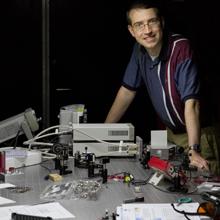The Research Corporation for Science Advancement (RCSA) has named David Hanneke, assistant professor of physics, winner of one of the organization’s Cottrell College Science Awards (CCSA). The prize, which began on July 1, provides $35,000 in support of the research of a junior faculty member in the physical sciences.

Hanneke will use the award for a project titled “Quantum Logic Spectroscopy of Charged Molecules.” “The basic goal of my research is to answer several questions,” he explained. “Do fundamental constants change in time? What symmetries does nature obey? My team and I will try to answer these questions using techniques where I trap atoms and molecules in very low numbers—one or two each—and measure their properties very precisely.” This summer, he said, he has four undergraduates working with him on the project. “We will start with trapping a beryllium ion and are already well underway with a laser system required for cooling and detecting the atoms. The CCSA will support the development of an atom trap, which will use electric fields in an ultrahigh vacuum environment. We will attempt to place a molecule in the same trap with the beryllium atom and measure some of its properties, which are particularly sensitive to changes in fundamental constants over time.”
Hanneke, who joined the faculty in July of last year, earned a bachelor of science degree from Case Western Reserve University and master of arts and doctorate degrees from Harvard University. He teaches introductory and modern physics courses at Amherst.
The CCSA program, the RCSA’s oldest initiative, was created in the early 1970s to promote basic research as a vital component of undergraduate education at primarily undergraduate institutions (PUI). In the last 15 years the CCSA program has supported the research work of approximately 1,300 PUI faculty members in more than 400 institutions and has generated research opportunities for thousands of undergraduates at both public and private institutions. According to the RCSA, the awards—which are meant to jump-start productive research programs— have proven to be a great tool to engage students in independent research, inspiring in them a passion for discovery and self-inquiry.
The CCSA specifically support research in astronomy, chemistry, physics and closely related fields at public and private PUI. The projects proposed are judged on the basis of scientific merit, originality, significance, feasibility, overlap with the three core disciplines and the ability of the institutional environment to sustain the activity. The involvement of undergraduate students in the research is expected and is an important factor in most awards. After review by the RCSA staff and outside referees, the composite proposal material is evaluated by an advisory committee of scientists drawn from the academic community. Awards are made to the institution on behalf of the individual investigator following approval by the RCSA Board of Directors.
Photo by Rob Mattson